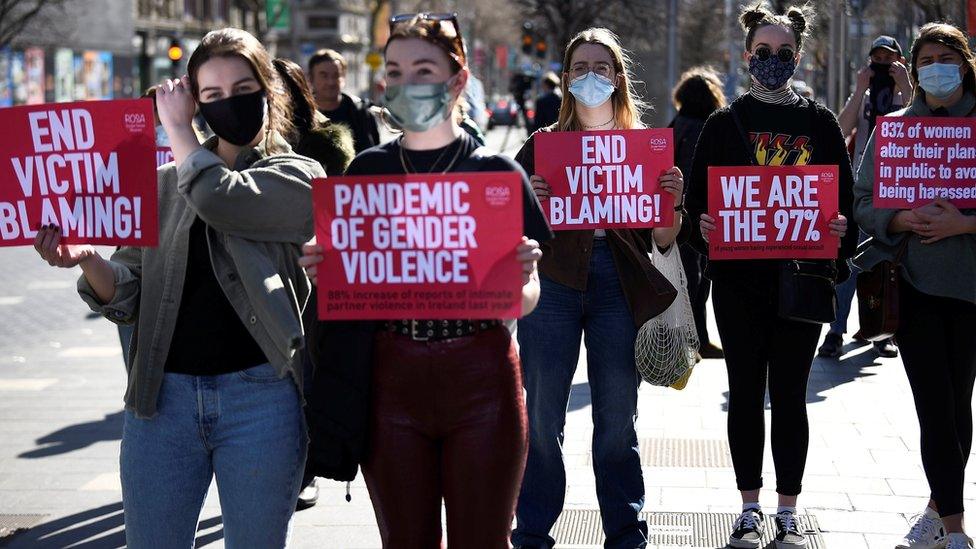Sexual assault claims 'mishandled' by universities
- Published

Samantha Kilford and Sydney Feder were two of the women to sign the letter
Women from 15 universities have signed a letter calling for a mandatory policy for dealing with sexual assault allegations in higher education.
The women said their allegations of sexual assault were mishandled by their universities.
Currently it is not compulsory for higher education institutions to implement a specific policy to deal with allegations of sexual assault.
Universities UK, external said "all universities have policies and practices in place".
It added it had created guidance to support the sector, external and that universities were accelerating efforts to address misconduct in recent years.
Samantha Kilford, 23, from Neath, is one of the women from across the UK to have signed the letter. She said she was sexually assaulted during freshers week by a student at the University of the West of England (UWE).
"The investigation took a year. It felt very dragged out and very secretive. It felt like they were waiting for me to give up," she said.
"It also felt like they were protecting him. In the investigation they even offered him the opportunity to interrogate me about what I had told them. He knew everything I was saying but I had no idea what his responses were.
"The most frustrating bit is that I still don't know what the result of the investigation was. They told me I wasn't allowed to know. They just said the complaint was upheld and that was it."

Samantha Kilford said she did not feel supported by her university during the investigation
In response, the UWE said that data protection laws "prevent the university from sharing all of the details of the final outcome" and that they "do not allow direct questioning between the alleged perpetrator and the student who has reported the incident".
It also said it takes "a zero-tolerance approach to sexual harassment and misconduct" and it would "be happy to talk to the reporting student concerned directly about her experience, any recommendations on how we can improve our practice, and our protocol on case outcomes''.
Sydney Feder, 23, initiated the letter after she said she was sexually assaulted during her final year at the Royal Welsh College of Music and Drama.
She said the college's investigation was negligent and made her feel "worthless" after she said she was "totally left out of the process" and that she was never told of the outcome of the investigation.
Ms Feder also started an online petition, external after a series of anonymous survivor accounts began to appear on Instagram from different universities through the pandemic. She said a "baseline safeguarding policy written by the government" is needed.

Sydney Feder has also started an online petition
The Royal Welsh College of Music and Drama said anything reported to them was "investigated thoroughly", and that "these specific allegations and questions raised are the subject of a sensitive and ongoing civil compensation claim to which the college has filed a robust defence".
What does the letter say?
The letter is also signed by 13 charities and campaign groups, including the 1752 group, which campaigns to end staff sexual misconduct in higher education.
The signatories list a number of suggestions in the letter for the governments to consider, including:
Each university to have a specially trained member of staff to deal with sexual assaults
Survivor testimonies during hearings to be completed without the alleged perpetrator present and the person accused should not be allowed to communicate with the survivor
The results of an investigation must be provided to everyone involved. Some universities do not tell the accuser of the outcome of their complaint - viewing it as a matter between the institution and the accused
Universities can no longer drag out investigations. A decision must be reached within three months of a report filed.
Currently, universities and colleges generally investigate allegations of sexual harassment and misconduct through their own internal complaints procedures., external
A recent study by John Edmonds and Eva Tutchell, authors of Unsafe Spaces, found there are a minimum of 50,000 sexual assaults at universities every year.
Through Freedom of Information requests from 102 universities in England and Wales, the same study said that only nine had satisfactory safeguarding policies for dealing with sexual assault. A third, 32, were considered by the authors as "very poor".
"Some of these universities' policies are like stuff out of the 19th Century. It's policy making in the dark. This is a national crisis," said Mr Edmonds.
Earlier this month, the Office for Students, England's independent regulator of higher education, called for universities to urgently review their policies by this summer.
Nicola Dandridge, chief executive of the Office for Students, said: "Over the next year we will examine how universities and colleges respond to our expectations. As part of this process, we will consider options for connecting the statement directly to our conditions of registration."
'We have to break the system'
Hannah, who studies at the University of Leicester, also signed the letter after she said her allegation of rape was not dealt with by the university.
"I felt like the university didn't care," she said. "I felt like they wanted to shut up this case with minimal cost and fuss.
"He was worth £36,000 to them. It felt like the money was worth more to them than doing what was right."
The University of Leicester said it was "fully committed to well-being and safety of students and staff" and "cannot comment on individual cases, however every disclosure is taken extremely seriously and investigated fully".
Hannah said: "They are a business, not an academic service. Money is their number one priority.
"If you touch that financial pocket it will break. We have to break the system. Someone has to intervene. That's why I've signed the letter."
What do the governments say?
The UK government said it was committed to working with the Office for Students and urged universities to engage with their statement of expectations and review their policies.
Both the Scottish government and the Northern Ireland Executive said they have set out clear expectations that institutions are expected to adopt to ensure they have efficient policies in place.
The Welsh government said they supported HEFCW's guidance for Higher Education institutions and fund specialist organisations to deliver training at universities across Wales.
What does Universities UK say?
In a statement, Universities UK, which represents the institutions around the country, said all UK universities have policies and practices in place to address all forms of harassment, as well as a code of practice for students which sets out expected behaviours.
"We have seen universities accelerating efforts to address harassment and misconduct in recent years, working together with dedicated students, staff and student unions to develop policies and campaigns to raise awareness and encourage students to have the confidence to come forward to report, knowing they will be listened to and that action will be taken by the university when needed," it said.
"The challenge is to make sure students know where to get help and support when they need it, and universities are constantly considering the best ways to signpost relevant information and appropriate support for all members of their community.
"Universities UK has created a wide range of national frameworks and guidance to support the sector in tackling violence against women, harassment and hate crime. We will continue supporting our members to bring about culture change by, embedding policies and best practice so that universities are safe places to live, work and study."
- Published29 April 2021

- Published19 April 2021

- Published31 March 2021

- Published29 March 2021

- Published18 March 2021
